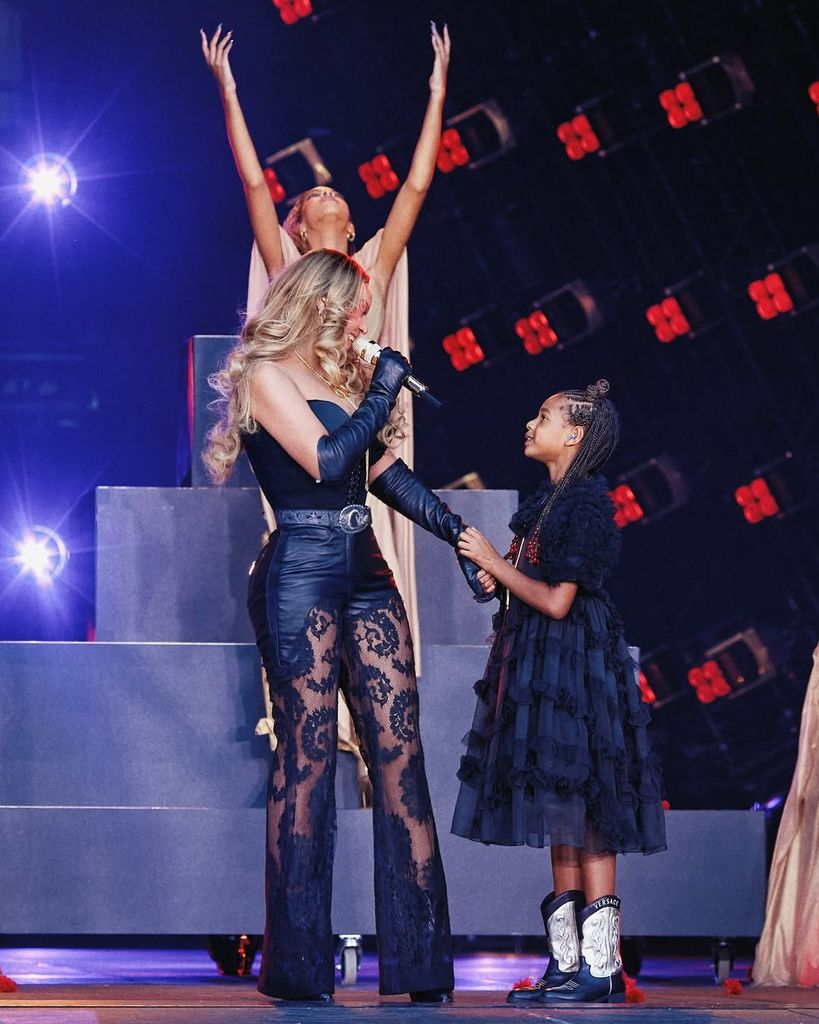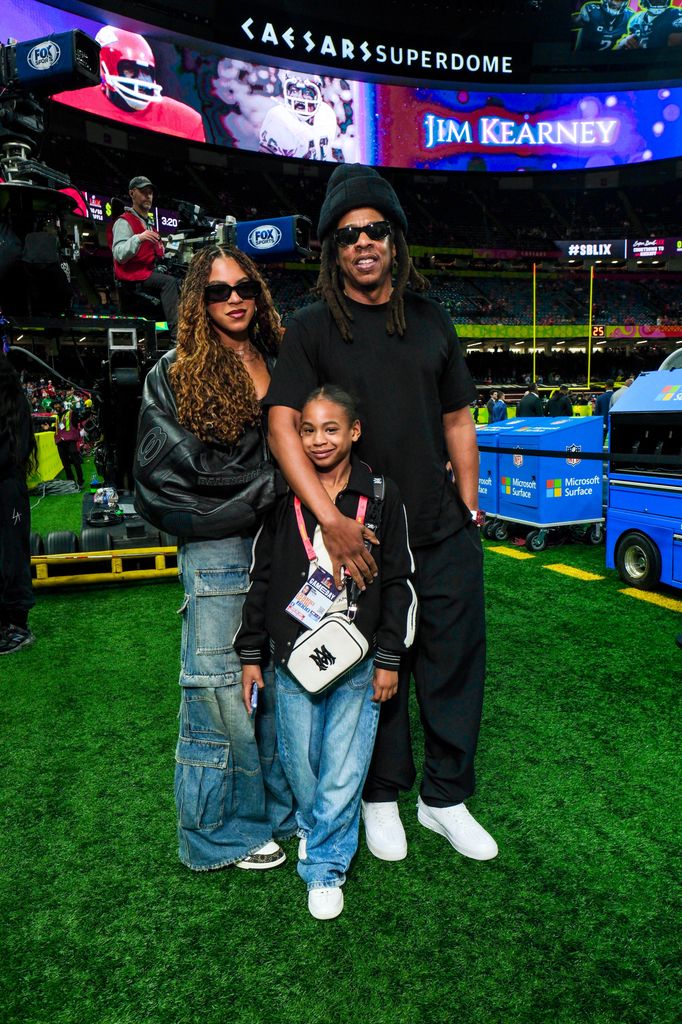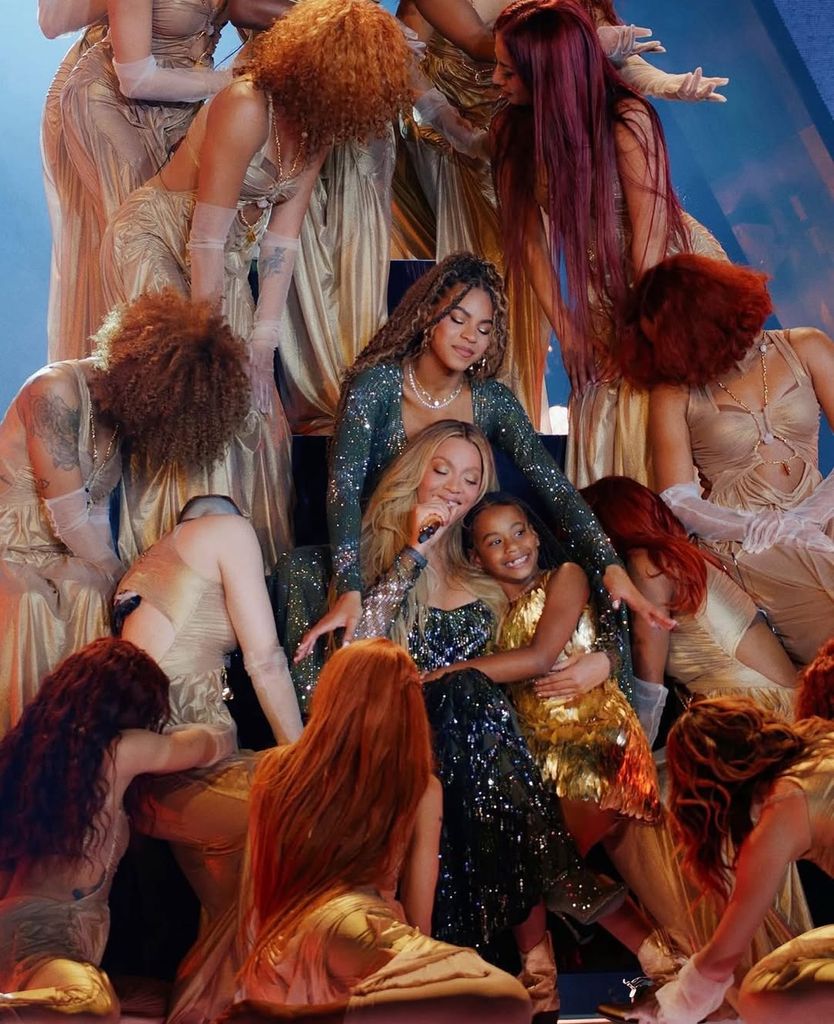There's a lot of chatter out there, it seems, about public figures and their families, especially when it comes to the children of very well-known people. It's a natural thing, I guess, for folks to be curious about those they admire, and sometimes that curiosity extends to personal matters. When we talk about someone like Rumi Carter, the daughter of Beyoncé and Jay-Z, that interest, you know, can really grow quite a bit, leading to all sorts of conversations among people.
This interest, perhaps, often sparks discussions about things like health or unique personal situations. It's a funny thing, but the internet, as a matter of fact, tends to amplify whispers and questions, making them seem much larger than they might be. So, when people start asking about Rumi Carter and questions pop up about her health, or whether she might have a disability, it creates a situation where many are trying to piece together information from various places.
It's important, though, to remember that at the heart of these conversations are real people, and their privacy is something that matters a great deal. This article aims to talk about these public discussions, looking at what has been said, and also to gently remind us all about the bigger picture of how we approach conversations around personal well-being, especially when it involves young individuals in the public eye. It’s almost like we forget they are just children, too.
- John Cena Schedule 2025
- Tattoos To Honor Your Mom
- Hummingbird Tree
- Natalia Rocha
- How Long Does A Womans Haircut Take
Table of Contents
- Rumi Carter - A Young Life in the Public Eye
- What Do We Know About Rumi Carter's Personal Life?
- Is There Any Truth to Rumi Carter Disability Rumors?
- How Does Public Speculation Affect Families Like the Carters?
- Understanding Ableism and Rumi Carter Disability Discussions
- What Challenges Did Beyoncé Share About Her Pregnancy?
- Supporting Individuals with Unique Needs and Rumi Carter Disability
Rumi Carter - A Young Life in the Public Eye
Rumi Carter is, of course, one of the twin children of the very famous music artists, Beyoncé and Jay-Z. Born on June 13, 2017, in Los Angeles, California, USA, she has been in the public eye more or less since her arrival. Despite having parents who are incredibly well-known globally, the Carter children, including Rumi, get to live lives that are, in some respects, pretty normal for kids their age. This balance between fame and everyday living is, you know, quite a delicate one for them.
She has, in fact, already appeared in some creative works associated with her mother. Rumi is known for her appearances in "Black Is King," which came out in 2020, and also in "Renaissance, A Film by Beyoncé" from 2023. These appearances give people a little glimpse into her life, but still, much of her childhood remains private, which is probably for the best. It's really quite something to be born into such a spotlight, isn't it?
Recently, Rumi was cheered on by crowds in London on June 12, just before her eighth birthday. This happened during her mother's "Cowboy Carter" tour, where Beyoncé even wished her twins, Rumi and Sir, a happy eighth birthday with the help of her fans at a London show. These moments are brief public showings, giving fans a chance to see the family together, but they don't really tell us much about their private world, which is actually how it should be.
- Payton Koch Naked
- Wwe European Championship History
- Survivor Book
- Franks Red Hot Goldfish
- Grandmother Die
What Do We Know About Rumi Carter's Personal Life?
When it comes to Rumi Carter's personal life, the information available to the public is, you know, fairly limited, and that's often by design. Her parents, Beyoncé and Jay-Z, are very protective of their children's privacy. We do know that Rumi was born alongside her twin brother, Sir Carter, on June 13, 2017. Their older sister is Blue Ivy. The family tries to keep many details of their lives away from the constant glare of the spotlight, allowing the children to experience childhood as much as possible without constant public scrutiny.
Public appearances are, typically, kept to a minimum, and when the children do appear, it’s usually for special family events or, as mentioned, in their mother's creative projects. For example, both Blue Ivy and Rumi Carter were proudly at their dad's side for Super Bowl Sunday, much to the delight of fans. These are moments shared, but they don't really offer much insight into their day-to-day lives or any specific personal details beyond what is visible. So, there’s not a lot of specific personal information out there, which is probably a good thing.
The family's approach seems to be about providing a grounded upbringing despite their extraordinary circumstances. Beyoncé has spoken a little about her children's unique needs, but this has been in a very general sense, about their lives away from the public eye. This desire for a semblance of normal living is, you know, a common thread among celebrities who want to shield their children from the intense pressure of fame. It’s a challenge, surely, but one they seem committed to handling. Here’s a quick look at some known details:
| Full Name | Rumi Carter |
| Date of Birth | June 13, 2017 |
| Place of Birth | Los Angeles, California, USA |
| Parents | Beyoncé and Jay-Z (Shawn Carter) |
| Siblings | Blue Ivy Carter (older sister), Sir Carter (twin brother) |
| Known For | Appearances in "Black Is King" (2020), "Renaissance, A Film by Beyoncé" (2023) |
Is There Any Truth to Rumi Carter Disability Rumors?
There has been, you know, quite a bit of talk swirling around, especially on the internet, about Rumi Carter and whether she might have a disability, with some people even asking if Rumi Carter is autistic or has special needs. It's a topic that comes up quite often, with speculation circulating regarding Rumi Carter’s possible autism. It's really important, though, to approach these discussions with a good deal of care and respect for privacy. The public discourse has also seen speculation surrounding Sir Carter, with some questioning whether he might be autistic as well. These are just rumors, it seems, without any confirmed information from the family.
The information provided by the family, as a matter of fact, does not confirm any of these rumors. Beyoncé has spoken about her pregnancies, but her comments have been about the difficulties she faced during her second pregnancy, which involved the twins, Rumi and Sir. She shared that her second pregnancy was problematic, as her body went through a lot of issues during the gestation period and developed several complications. This took a toll on the singer’s health, as revealed in her Netflix documentary "Homecoming." She developed preeclampsia and underwent an emergency C-section. These were health challenges for Beyoncé herself, not statements about her children's health conditions at birth or later.
It's very common, perhaps, for public figures to face this kind of speculation, especially when they keep their private lives somewhat shielded. Without any official statement from Beyoncé or Jay-Z, any claims about Rumi Carter having a disability, or specifically autism or Down syndrome, remain just that – unconfirmed rumors. It's really quite important to distinguish between public curiosity and actual confirmed facts, especially when it concerns a young child's personal health. So, while people are talking, there’s no official word on any Rumi Carter disability.
How Does Public Speculation Affect Families Like the Carters?
Public speculation, especially about the health of children, can be, you know, incredibly difficult for families, whether they are famous or not. For families like the Carters, who live under an intense spotlight, these kinds of rumors can add a significant layer of stress and privacy concerns. It means that every little thing, every picture, every public appearance, might be scrutinized by people looking for "signs" to support a rumor. This kind of attention, in a way, strips away some of the normalcy that parents try to provide for their children, even if they are public figures.
It also, typically, creates a situation where families might feel pressured to address or deny things that are deeply personal, which they have every right to keep private. The constant questioning, the online discussions, and the spread of unverified information can be quite overwhelming. It's a reminder that even though we might feel a connection to celebrities, they are still individuals with feelings and a right to privacy, especially when it comes to their children. So, this kind of talk really does have an impact, even if we don’t always see it.
The focus, it seems, should really be on respecting the boundaries that families set. When rumors circulate regarding Rumi Carter’s possible autism, it’s critical to remember that these are private medical matters. The best thing we can do is to respect their privacy and avoid spreading unconfirmed stories. This helps create a more considerate public space, which is, you know, better for everyone involved. It’s just a little bit of kindness, really.
Understanding Ableism and Rumi Carter Disability Discussions
The conversations around Rumi Carter and the speculation about her having a disability, or whether she might be autistic, actually touch upon a much broader topic in society: ableism. Ableism is, basically, a system of discrimination and social prejudice against people with disabilities. It often shows up in assumptions people make about what a "normal" or "healthy" person should be like, and how they should function. This kind of thinking, you know, can really shape how we talk about individuals, especially children, and their perceived differences.
One of the pieces of information mentioned in the text points out that a video is a "crash course in how ableism is baked into American policy and culture." This includes things from the underpayment of disabled workers to the use of guardianship laws that strip people of autonomy. When people speculate about a child having a disability, it can, in a way, stem from this underlying ableist view that sees disability as something to be "diagnosed" or "explained" by the public, rather than something that is just a part of human variation and personal experience. It's a subtle thing, but it’s there.
It's important to recognize that discussing a child's health status without the family's consent, especially when it involves a potential disability, can be an act of ableism itself. It places an undue focus on perceived differences and can contribute to a culture where people with disabilities are seen as "other" or as subjects of public discussion rather than individuals deserving of privacy and respect. So, when we see discussions about Rumi Carter disability, it’s a good moment to reflect on our own perspectives and whether they are truly supportive and inclusive, or if they, you know, lean a bit into ableist ways of thinking.
What Challenges Did Beyoncé Share About Her Pregnancy?
Beyoncé has been, you know, quite open about the challenges she experienced during her pregnancy with the twins, Rumi and Sir Carter. She shared details in her Netflix documentary "Homecoming," which gave fans a rare look into her personal journey. She described the pregnancy as "extremely difficult." This was not, as a matter of fact, a simple or easy time for her body. She went through a lot of issues during that period, and it really took a toll on her overall health.
Specifically, Beyoncé revealed that she developed preeclampsia, which is a serious condition that can occur during pregnancy and involves high blood pressure. This condition can be quite dangerous for both the mother and the babies. Because of these complications, she had to undergo an emergency C-section to deliver Rumi and Sir. These are very personal and intense medical details that she chose to share, giving people a glimpse into the difficulties she faced as a mother-to-be. So, her focus was very much on her own health struggles during that time.
Her openness about these personal health challenges during pregnancy is a significant point. It helps people understand the very real difficulties some mothers experience. However, it's really quite important to understand that her sharing of these personal pregnancy struggles is distinct from any speculation about her children's health. Her comments were about her own physical journey and the complications she endured, not about any specific health conditions of Rumi or Sir after their birth. It’s a very different thing, you know, to talk about a mother’s experience versus a child’s private medical details.
Supporting Individuals with Unique Needs and Rumi Carter Disability
Beyond the specific discussions about Rumi Carter and any speculation about a disability, there's a broader, more important conversation to be had about supporting individuals with unique needs. This includes understanding what it means to live with a disability and how society can be more inclusive. The text, for example, mentions a "Minnesota disability roommate matching service," which helps people with disabilities find supportive roommates. This kind of service, in a way, fosters independence and helps individuals build a life, not just a living. It’s about practical support, you know, that makes a real difference.
The idea of supporting people with unique needs also extends to how we view and talk about differences. Instead of speculating or making assumptions, a more helpful approach is to focus on creating environments where everyone feels valued and has opportunities to thrive. This means advocating for policies that promote autonomy and fair treatment for people with disabilities, rather than those that strip them of their rights. It’s about building a world where everyone, regardless of their abilities, can participate fully and live with dignity. So, this is a much bigger picture than just one family.
Ultimately, when conversations arise about children like Rumi Carter and questions about their health, it presents an opportunity for us to reflect on our collective values. It’s a chance to consider how we can be more respectful, more empathetic, and more supportive of all individuals, especially those who might face unique challenges. It’s really quite simple: focusing on kindness and privacy for all children, regardless of their family's public standing, is always the best way forward. It’s just, you know, the right thing to do.
- Lana Del Rey Style
- New Thriving Near Me
- Elizabeth Baur
- Who Shot Cheyenne And Zach
- John Cena Schedule 2025


